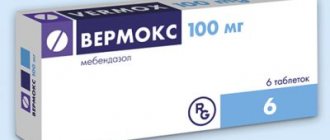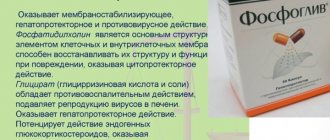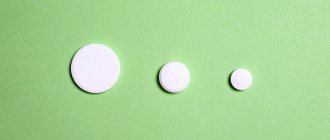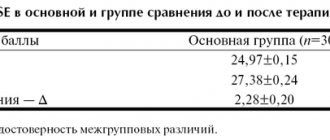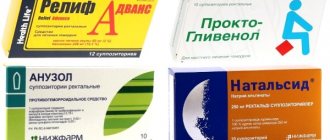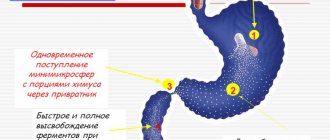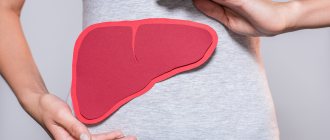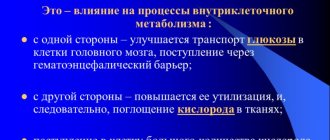Infectious disease specialist
Sinitsyn
Olga Valentinovna
34 years of experience
Highest qualification category of infectious disease doctor
Make an appointment
The most common type of helminthiasis in the world is enterobiasis. This disease is caused by intestinal parasites - pinworms, which settle in the small intestine of a person, provoking a variety of intestinal and toxic-allergic disorders. In Russia, it accounts for up to 70% of all cases of human helminthiasis. A characteristic feature of this type of helminthiasis is the passage of the full cycle of development of the parasite in the host’s body.
General information about the pathogen
The disease is anthroponotic, i.e. transmitted from person to person. The causative agent of enterobiasis is a roundworm, not exceeding 6-10 mm in length. The habitat is the cecum and appendix. Worms feed on digested food, but can attach to the intestinal wall and suck the host's blood.
The lifespan of the parasite does not exceed two months. Reproduction occurs through the laying of eggs, for which the females, during human sleep at night, are selected through the relaxed sphincter of the anus. This process causes severe itching in a person. By scratching the skin, a person transfers the eggs to his own hands, then they fall onto household objects and into the mouth. Primary invasion occurs during contact with an infected person or objects that he touched with contaminated hands. Eggs can be spread on the legs of flies and cockroaches, as well as with house dust.
Already 5-6 hours after laying by the female, the embryos in the eggs transform into larvae. After entering the intestine, the larva emerges from the egg and develops into an adult within 3-4 weeks. Then the process is repeated.
Outside the human body, pinworm eggs remain viable for a month. They are resistant to most external factors, including disinfectants and room quartz treatment. When boiled, the larvae die almost instantly, but when surfaces are treated with ethyl alcohol, ether or carbolic acid, destruction occurs no earlier than after five minutes of constant contact with the substance.
Signs of pinworms in children
Maintaining personal hygiene - preventing enterobiasis
If a parent notices such symptoms in their child, this may serve as the appearance of “unwanted guests” in the young body:
- Itching in the anal area. This indicates that the female is already laying eggs. Most often, this symptom intensifies at night, when the body is at rest.
- Mechanical damage to the skin in the buttocks area. It is impossible to stop yourself from scratching the infected area. Babies can scratch their skin until it bleeds. This can cause additional complications in the form of infections and inflammation.
- Disorder of the gastrointestinal tract. This symptom indicates that the child has been sick for quite a long time and a large number of helminths live in his body.
- Nervous system disorder. Restless sleep, irritability, and headache can become symptoms of life activity in the intestines of worms.
- Vomiting, pale skin, nausea, fever, dizziness. These are symptoms of intoxication caused by the active work of pinworms. The waste that parasites produce is toxic and spreads throughout the body.
- Detection of mucus in stool. Mucus is the toxic waste of the parasite. It is released and enters the intestines. Detection of “white threads” in the stool. These are the very “worms”. If parents have not identified them in their child’s excrement, this does not mean that he is not sick. The female may not lay eggs every day.
These symptoms cause loss of appetite, resulting in weight loss. Toxic substances secreted by worms most affect the nervous system.
A sick child sleeps poorly, is irritable, pale, motionless, and refuses to eat.
Causes of infection
Most often, doctors detect enterobiasis in children, since they are much more likely than adults to:
- do not follow hygiene rules: do not wash their hands after contact with potentially contaminated surfaces, soil, visiting a public bathroom, before eating, etc.;
- eat on the street;
- lick or suck fingers, toys and other objects;
- They bite their fingernails.
The same actions cause helminthic infection in adults: enterobiasis is often called the disease of dirty hands.
Treatment
The course of therapy for worms in children includes several stages - preparation, therapy and cleansing. During the entire treatment, it is necessary to carry out general preventative measures and carefully observe hygiene to avoid re-infection or infection of one of the family members. Some types of worms, such as tapeworms and echinococci, can only be removed surgically.
The preparatory stage involves taking sorbents - Smecta, Entegnin, which absorb toxins and cleanse the body. They are followed by antihistamines, they relieve general itching and prevent the development of allergic reactions to drugs.
Treatment of helminthiasis in children at the main stage is directly taking anthelmintic drugs in the form of tablets, suppositories or suspensions. Medicines are selected depending on the type of helminth, individual indications and contraindications. Some anthelmintics work in 2 doses:
- the first course kills already developed individuals;
- the second course helps to cope with larvae and eggs (prescribed 2 weeks after the first).
Cleansing is designed to rid the body of the remnants of dead parasites; at this stage, sorbents, enemas, and choleretic drugs are used. You can help your baby by adding raw carrots, dairy products, coarse bread, fruits, vegetables, fish oil, nuts, especially walnuts and peanuts to the diet.
Additionally, to restore the body in case of serious damage, vitamin complexes, iron, minerals, and a special diet can be used, which will increase hemoglobin, restore liver function and strengthen the body as a whole. The doctor describes the treatment plan in detail, avoiding side effects. Control tests are required. Self-medication and deviation from the plan are not allowed.
How to recognize helminthic infestation?
About two weeks pass from the moment of infection, after which the first signs of enterobiasis appear. The skin around the anus becomes red and irritated, the patient feels itching in this area, which intensifies at night, when female pinworms crawl out to lay eggs. And due to constant scratching, abrasions and small wounds can form on the skin, often with suppuration and pyoderma. If the disease lasts for a long time and hygiene rules are not observed, abscesses or granulomas can form in the anus, the contents of which contain eggs or adult female pinworms.
Due to constant irritating itching, the patient develops astheno-neurotic syndrome: decreased performance, headaches, irritability, increased fatigue, and night sleep disturbances.
The vital activity of pinworms in the intestines leads to the development of abdominal manifestations of the disease - abdominal pain localized in the navel, increased frequency of bowel movements, and bloating. The consistency of stool changes: it softens and resembles a paste in consistency, and mucus appears. Some patients experience occasional nausea.
Almost the only symptom of enterobiasis in children is itching in the anal area, which causes sleep disturbances. It persists for a long time after getting rid of the parasites, since a stable focus of excitation is formed in the brain. In girls, the disease is more severe than in boys, since pinworms can penetrate the genitals, causing the development of vulvitis and endometritis, as well as inflammation of the urinary tract.
Due to repeated repeated infections, the disease lasts a long time. Parasites change the intestinal biocenosis, due to which the protective function of the microflora decreases, and the number of lactone-negative microorganisms in the intestine increases. The secretion of digestive enzymes deteriorates, which leads to a decrease in the digestive function of the intestine. Lack of nutrients leads to weight loss and delayed physical development of the child.
The disease can occur in mild, moderate or severe form, which is reflected in the symptoms. The severe form is most common in children. Adults, as a rule, are ill asymptomatically or with minor manifestations, which are expressed in decreased performance and disturbances in night sleep. We can talk about the chronic course of the disease starting from the second month of infection.
Are you experiencing symptoms of enterobiasis?
Only a doctor can accurately diagnose the disease. Don't delay your consultation - call
Disease prevention
To prevent a child from becoming infected with parasites, he needs to instill personal hygiene skills and ensure that:
- his nails were trimmed;
- he had no contact with street animals;
- did not put dirty objects into his mouth. Source: Clinical recommendations (treatment protocol) for providing medical care to children with enterobiasis, Federal State Budgetary Institution Scientific Research Institute of Infectious Diseases, Federal Medical and Biological Agency of Russia, Public organization "Eurasian Society for Infectious Diseases", Public organization "Association of Infectious Disease Doctors of St. Petersburg and the Leningrad Region" (AVISPO)
If you suspect enterobiasis in a child, you should consult a doctor as soon as possible and undergo a course of treatment. You can make an appointment with a medical pediatrician 24 hours a day by phone or leave a request to have a doctor come to your home.
Sources:
- https://www.ncbi.nlm.nih.gov/pmc/articles/PMC2306321/JP Caldwell Pinworms (Enterobius Vermicularis) Can Fam Physician. 1982 Feb; 28: 306–309.
- R.A. Fayzullina, E.A. Samorodnova, V.M. Dobrokvashina Helminth infections in childhood // Practical Medicine, 3(42) May 2010.
- Clinical recommendations (treatment protocol) for the provision of medical care to children with enterobiasis FGBU NIIDI FMBA RUSSIA, Public organization "Eurasian Society for Infectious Diseases", Public organization "Association of Infectious Disease Doctors of St. Petersburg and the Leningrad Region" (AVISPO)
Markova Daria Olegovna Clinic
Author of the article
Markova Daria Olegovna
Specialty: pediatrician
Experience: 15 years
The information in this article is provided for reference purposes and does not replace advice from a qualified professional. Don't self-medicate! At the first signs of illness, you should consult a doctor.
Diagnostic methods
The diagnosis of enterobiasis is based on the examination of scrapings from the surface of the skin of the perianal zone to detect pinworm eggs. The material for research is collected with a spatula from the surface of the skin or an imprint is made on adhesive transparent tape (Graham method). Previously, a smear was taken with a cotton swab attached to a stick, but now the use of a spatula or adhesive tape is considered more effective. In severe cases of the disease, not only eggs, but also large numbers of adult pinworms are found in stool samples taken for analysis. To confirm the diagnosis, samples are taken three times at intervals of one to two days.
The doctor may order a clinical blood test to detect eosinophils, which is necessary in cases where not too much time has passed since the infection.
Dekaris
Decaris - paralyzes the nervous system of pinworms.
Another name for Decaris is Levomisole. This drug was initially used as an immunomodulator, but as an anthelmintic it began to be used much less frequently.
The mechanism of action of Dekaris: the medicine paralyzes the nervous system of pinworms, which are excreted from the intestines within 24 hours. This medicine can be taken with caution during pregnancy, but it is completely unacceptable when breastfeeding a child, and when treating enterobiasis in children under 3 years of age.
The recommended dose is from 25 mg (1 tablet) in children to 50 mg (2 tablets) in older schoolchildren and adults. The tablets are taken in the evening, after dinner. They need to be washed down with a small amount of water.
In addition to the above contraindications, the drug should not be taken by patients with agranulocytosis; persons with renal or hepatic insufficiency should be used with caution. In case of overdose (600 mg and above), the following symptoms may appear:
- vomiting and nausea,
- headache,
- confusion,
- dizziness,
- convulsions.
Gastric lavage immediately after an overdose relieves most of the symptoms of poisoning.
It is highly not recommended to combine treatment of enterobiasis with Dekaris with alcohol intake.
How to get rid of helminths
When pinworms are detected in one family member, treatment of enterobiasis is necessary not only for him, but also for everyone who has close contact with him, i.e., all family members living in the same apartment. The basis of therapy is the use of specific anthelmintic drugs, which are carried out twice with a two-week interval. In addition, young children are prescribed cleansing enemas to remove parasites accumulated in the rectum from the body.
You can take medications against helminths only as directed by a doctor, after examination and an accurate diagnosis. Self-use of the medicine is strictly prohibited, since antiparasitic drugs are unsafe for health and are prescribed only after assessing the patient’s condition.
Along with drug treatment, it is necessary to take measures to prevent re-infestation:
- cut your nails short;
- carefully observe hygiene requirements;
- wear thick underwear at night;
- Before going to bed, place a cotton swab lubricated with Vaseline ointment in the anus;
- every morning, remove bed linen, wash and iron with a hot iron on both sides;
- Wash thoroughly in the morning and evening;
- Wet clean the apartment with soapy water twice a day.
At the end of the course of treatment, after two weeks, 25 and 30 days, samples of the contents of the perianal folds are taken from the patient for pinworm eggs.
Diagnosis of enterobiasis in children
Some believe that infection occurs from pets
If they detect signs of pinworms in their children, parents contact their pediatrician. He, in turn, can prescribe an examination himself, or send him for a consultation with a gastroenterologist and parasitologist. First of all, the specialist will conduct a survey, including basic questions to determine a possible diagnosis. Key questions will include:
- Main complaints
- First symptoms and when they appeared
- How many family members have similar symptoms?
- Does the family practice good hygiene?
The next step will be to assign research:
- Examination of feces. The laboratory takes a stool test for worm eggs. For the analysis to be reliable, it is necessary to take the biomass to the laboratory within an hour after defecation. It is necessary to prevent urine from coming into contact with feces. Analysis from different parts of the stool is collected in a disinfected container. 2 teaspoons are enough for an accurate diagnosis. If the basic rules are not followed, the result may be unreliable.
- Scraping in the anal area. The study is carried out in the morning. The patient should not go to the toilet before this and should not wash himself. The procedure is quite simple: a special film is applied to the skin area. Helminth eggs stick to it, which can be detected under a microscope.
- Blood tests. A general blood test is done. In the presence of enterobiasis, eosinophilia is detected - an increase in eosinophils in the blood. In rare cases, anemia is detected, a decrease in hemoglobin and red blood cells. This disease can be caused by a large number of helminths and a simultaneous infectious disease
If there are any signs of enterobiasis, it is recommended to immediately visit a doctor and undergo the necessary tests. Timely detection and treatment of the disease eliminates the development of complications.
How to avoid infection
The main measures to prevent enterobiasis are to comply with hygiene requirements:
- mandatory hand washing after visiting the toilet, walking, visiting public places, contacting animals, etc.;
- nail care, getting rid of the habit of biting nails;
- frequent replacement of bed linen, towels, hygiene items;
- washing underwear and bed linen in hot water, followed by ironing and steaming;
- wet cleaning with disinfectants every two to three days.
Pirantel
Pyrantel is the most common drug for pinworms.
This drug is offered to consumers in dosage forms such as tablets, suspension, and chewable tablets. Its mechanism of action is that Pyrantel blocks the neuromuscular system of worms, after which they are freely removed from the intestines.
It acts on pinworms in all phases of their development, and, in addition to pinworms, the drug is effective against several types of worms. Pyrantel is taken once, it is best to do it after breakfast.
The effectiveness of the therapeutic dose depends on the weight of pinworm carriers - it is 10 mg per kg of body weight. In order to prevent self-infection, Pirantel should be repeated after 21 days, and all family members should be treated.
This drug has contraindications in the form of hypersensitivity to the components of the drug, and myasthenia gravis during the treatment period. Although Pirantel is used in pregnant women and infants up to 6 months, it is recommended to do so with caution. An overdose of Pyrantel is manifested by the following symptoms:
- vomit,
- nausea,
- diarrhea,
- increase in body temperature,
- skin rash, allergic urticaria,
- hallucinations,
- sleep disorders,
- headache.
There is no need to use a laxative after taking Pirantel.
Zentel
Zentel disrupts the process of glucose transport in the body of pinworms.
The drug Zentel (Albendazole) in the treatment of enterobiasis disrupts the process of glucose transport in the body of pinworms, thereby causing their death and elimination from the body naturally.
Zentel is available in the form of a suspension and tablets. The product is not recommended for use by children under one year of age, nursing or pregnant women. This list also includes patients with hypersensitivity to the components of the drug.
Children from one to three years old take Zentel only in the form of a suspension. The recommended dose is 400 mg once. For low weight, the dose is calculated individually - 15 mg per kg of weight. In case of overdose, the following symptoms may appear:
- dizziness,
- stomach ache,
- vomit,
- itching, urticaria,
- hyperthermia,
- hepatitis.
Zentel is effective against enterobiasis in all phases of pinworm development.
